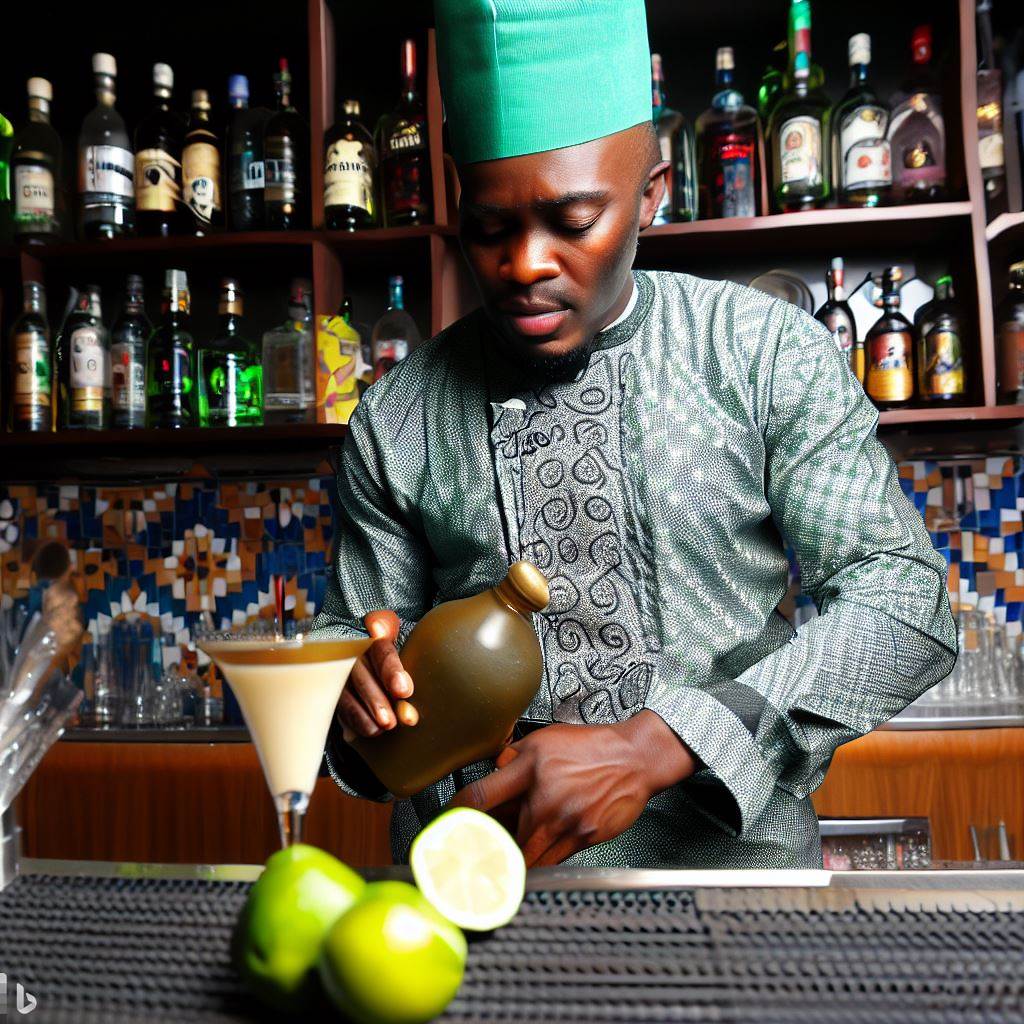Introduction
Nigerian bartending stands out for its unmistakable and captivating taste fusions.
Incorporating indigenous ingredients not only amplifies the authenticity of Nigerian cocktails but also celebrates the country’s cultural identity.
This blog post embarks on an exciting journey to uncover the rich tapestry of flavors that define Nigerian bartending.
In the realm of Nigerian mixology, a myriad of distinctive and renowned flavor combinations awaits exploration.
From the tangy notes of hibiscus-infused drinks to the fiery kick of ginger-spiced concoctions, each sip tells a story of tradition and innovation.
These flavors serve as a testament to the creativity and resourcefulness of Nigerian bartenders.
By harnessing the bounty of locally-sourced ingredients, bartenders infuse their creations with a genuine sense of place.
Palm wine, tamarind, and exotic fruits like the African star apple weave an intricate tapestry of tastes that reflect the country’s diverse regions and culinary heritage.
Join us on this flavorful expedition as we venture into the heart of Nigerian bartending, where each drink is a harmonious symphony of indigenous ingredients, culture, and an unwavering passion for crafting the extraordinary.
Overview of Local Nigerian Ingredients
A. Commonly used local fruits and herbs
1. Examples: tamarind, banga fruit, baobab fruit, ogbono
Nigeria is blessed with a rich variety of local ingredients that add unique flavors to bartending. These ingredients include commonly used fruits and herbs.
Tamarind is a tangy fruit that adds a sour and citrusy flavor to drinks. It is often used in cocktails to give them a refreshing twist.
Banga fruit, also known as palm fruit, has a sweet and tropical taste. Its flavor is reminiscent of coconuts and adds a fruity sweetness to cocktails.
Baobab fruit is another popular ingredient that imparts a tangy and slightly sour taste. It has a unique and distinct tanginess that can enhance the overall flavor profile of a cocktail.
Ogbono, a type of wild mango, provides an earthy undertone to drinks. Its flavor complements other ingredients and adds depth to the overall taste.
B. The unique flavors they bring to bartending
1. Tanginess, fruity sweetness, earthy undertones
The local Nigerian ingredients mentioned above bring a wide range of unique flavors to bartending. The tanginess of tamarind adds a refreshing and zesty kick to cocktails.
It balances out the sweetness of other ingredients, creating a well-rounded taste profile.
The fruity sweetness of banga fruit adds a tropical twist to cocktails. It can be used to create fruity punches or enhance the sweetness of mixed drinks.
Baobab fruit, with its tangy and slightly sour taste, adds a delightful tanginess to cocktails. It brings a distinct and refreshing flavor that sets a drink apart.
The earthy undertones of ogbono bring depth and complexity to cocktails. It provides a subtle and intriguing flavor that can elevate a drink’s taste profile.
These unique flavors contribute to the overall experience and make Nigerian-inspired bartending stand out.
C. The cultural significance of these ingredients
These local ingredients hold cultural significance in Nigerian cuisine and bartending.
They have been a part of traditional recipes and practices for generations, passed down through families and communities. Using these ingredients in modern bartending preserves and celebrates Nigerian heritage.
These ingredients not only enhance the flavor of drinks but also reflect the diverse cultural tapestry of Nigeria.
They showcase the nation’s rich culinary history and the importance of local produce in Nigerian cuisine.
Incorporating these ingredients in bartending pays homage to Nigerian traditions and promotes local agricultural practices.
Furthermore, the use of local ingredients in bartending supports local farmers and encourages sustainable sourcing.
It promotes a sense of pride in Nigerian produce and encourages a deeper appreciation for the flavors and resources available within the country.
In fact, local Nigerian ingredients, such as tamarind, banga fruit, baobab fruit, and ogbono, bring unique flavors to bartending.
These ingredients contribute tanginess, fruity sweetness, and earthy undertones, creating well-rounded and distinctive cocktails.
They also hold cultural significance, representing Nigeria’s culinary heritage and supporting local agriculture.
Read: Women in Bartending: Breaking Barriers in Nigeria
Traditional Nigerian Cocktails
Nigeria is not only known for its vibrant culture and rich history, but also for its unique and flavorful cuisine.
When it comes to bartending, Nigerian mixologists have mastered the art of incorporating local ingredients into their cocktails, resulting in one-of-a-kind flavors that cannot be found elsewhere.
In this section, we will explore some popular traditional Nigerian cocktails and discuss how the use of local ingredients adds a distinct twist to these beverages.
A. Popular traditional cocktails in Nigeria
1. Chapman
This delightful cocktail is a favorite among Nigerians. It is made by combining local fruits such as oranges, lemons, and limes with soda.
The vibrant red color and fruity taste make Chapman a refreshing choice, especially on hot summer days.
2. Palmwine cocktail
Palmwine, a naturally fermenting sap extracted from palm trees, is a popular traditional drink in Nigeria.
Mixologists have taken this traditional beverage to the next level by blending it with citrus flavors like lemon or lime.
The result is a refreshing and tangy cocktail that showcases the richness of Nigerian ingredients.
B. How local ingredients add a distinct twist
1. Traditional cocktails infused with Nigerian flavors
What sets Nigerian cocktails apart from their international counterparts is the infusion of local flavors.
Nigerian mixologists often use indigenous fruits, herbs, and spices to create unique flavor profiles.
For example, the addition of tamarind, a tangy fruit commonly found in Nigerian cuisine, adds a pleasant twist to cocktails, giving them a distinctive taste that cannot be replicated.
Additionally, Nigerian mixologists make use of local spirits such as Ogogoro, a strong, locally distilled liquor, to add depth and character to their creations.
These traditional ingredients not only enhance the flavor but also celebrate Nigeria’s rich culinary heritage.
In short, traditional Nigerian cocktails offer a delightful experience for both locals and foreigners alike.
With their vibrant colors, unique flavors, and the use of local ingredients, these cocktails showcase the cultural richness of Nigeria.
Whether it’s the fruity delight of Chapman or the tangy freshness of a palmwine cocktail, these traditional drinks are a testament to the creativity and ingenuity of Nigerian bartenders.
So, the next time you’re in Nigeria, be sure to indulge in these local delights and experience the true taste of Nigerian bartending.
Read: Cocktail Culture in Nigeria: A Bartender’s View

Innovative Nigerian Mixology Techniques
A. Introduction of modern mixology trends in Nigeria
Nigeria’s bartending scene has witnessed a revolution with the introduction of modern mixology techniques.
1. Examples of unique techniques using local ingredients
Nigerian mixologists have creatively incorporated local ingredients into their cocktail creations.
- Homemade fruit syrups and infused spirits are widely used to enhance flavors and add a local touch.
- Smoking techniques utilizing local herbs have gained popularity for adding depth and complexity to drinks.
B. How these techniques elevate the Nigerian bartending scene
In recent years, Nigeria’s bartending scene has undergone a captivating transformation, introducing innovative techniques that have enriched both flavors and experiences.
Nigerian mixologists have embraced modern mixology trends, ingeniously incorporating local ingredients into their craft.
They’ve created homemade fruit syrups and infused spirits using locally sourced fruits and herbs, infusing their cocktails with an authentic Nigerian touch. This not only imparts distinct flavors but also supports local agriculture.
Another trend gaining popularity is the use of smoking techniques with local herbs.
Mixologists employ smoking equipment to infuse cocktails with the aromatic essence of indigenous herbs, elevating the sensory experience for patrons.
These inventive techniques have elevated the country’s bartending scene, enabling mixologists to craft signature drinks that reflect Nigeria’s rich flavors.
The use of homemade ingredients and smoking methods adds versatility and intrigue to the cocktails.
These innovations have not only satisfied palates but have also boosted the reputation of Nigerian bartending.
They demonstrate the creativity of local mixologists, placing them on par with international peers.
Furthermore, the use of indigenous ingredients preserves cultural heritage and supports local farmers and businesses.
In general, modern mixology trends have ushered in a wave of innovation in Nigerian bartending, creating unique flavors and unforgettable experiences.
Nigerian mixologists continue to push the boundaries of cocktail creativity, putting the nation on the global mixology map.
Read: Networking Tips for Bartenders Working in Nigeria
Exploring Regional Variations
Nigeria is a country rich in diverse flavors, thanks to its different regions and their unique ingredients.
In this section, we will explore the regional variations in Nigerian bartending and how they contribute to the creation of unique flavors.
A. Description of different Nigerian regions and their unique flavors
1. Northern Nigeria – hibiscus and sorrel-based drinks
Starting with Northern Nigeria, this region is known for its love for hibiscus and sorrel.
These ingredients are commonly used to make refreshing and tangy drinks.
The locals believe that these beverages have numerous health benefits, including aiding digestion and reducing blood pressure.
2. Coastal areas – coconut and seafood-infused cocktails
On the other hand, the coastal areas of Nigeria offer a completely different flavor experience.
Here, coconut and seafood-infused cocktails are the stars of the bartending scene.
The combination of coconut water or milk with local seafood creates a tropical and savory taste that perfectly complements the coastal ambiance.
B. Highlighting how regional variations impact flavor profiles
These regional variations have a significant impact on the flavor profiles of Nigerian cocktails.
The use of hibiscus and sorrel in the North gives a vibrant and slightly tart taste to the drinks.
This flavor is unique to the region and cannot be replicated with any other ingredients.
Similarly, the coastal regions’ love for coconut and seafood creates a distinct flavor profile that cannot be found elsewhere.
The richness of the coconut, combined with the freshness of the seafood, results in a taste that transports you to the beautiful Nigerian coastline.
1. Combining ingredients from different regions for innovative cocktails
What makes Nigerian bartending even more fascinating is the combination of ingredients from different regions to create innovative cocktails.
Bartenders have started experimenting with the diverse flavors by mixing hibiscus with coconut or infusing sorrel into seafood-based drinks.
These creative combinations have resulted in unique and exciting flavor profiles that showcase the best of Nigerian ingredients.
Imagine sipping on a cocktail that combines the tartness of hibiscus with the creaminess of coconut, topped with a hint of seafood essence.
This kind of fusion showcases the versatility of Nigerian bartending and highlights the exciting possibilities that come with exploring regional variations.
Whether you prefer the tangy flavors of Northern Nigeria or the tropical taste of the coastal areas, Nigerian bartending has something unique to offer.
The use of local ingredients opens up a world of flavors that truly embody the essence of the country and its regions.
Basically, Nigerian bartending is a celebration of regional variations and the unique flavors they bring.
From hibiscus and sorrel in the North to coconut and seafood on the coast, each region has its own signature taste.
By combining these ingredients, bartenders create innovative and exciting cocktails that highlight the best of Nigerian flavors.
Publish Your Professional Profile, Business or Brand
Showcase your expertise, gain trust, and boost visibility instantly on Professions.ng.
Publish NowSo, if you ever get the chance, make sure to try these local ingredients and experience the vibrant world of Nigerian bartending.
Incorporating Nigerian Flavors in International Mixology
A. The growing popularity of Nigerian ingredients worldwide
In recent years, the use of local ingredients in cocktail-making has gained significant popularity globally.
Bartenders and mixologists are constantly seeking unique flavors to create innovative and memorable drinks.
Nigeria, with its rich and diverse culinary heritage, has become a flourishing source of inspiration for mixologists around the world.
B. Examples of Nigerian flavors used in international cocktails
1. Citrusy warmth of tamarind in margaritas
Nigerian ingredients are renowned for their distinctive tastes, and their incorporation in international cocktails adds a refreshing twist to traditional favorites.
One such ingredient is tamarind, known for its tangy and citrusy flavor.
This tropical fruit is commonly used in traditional Nigerian cuisine, and its unique taste adds a delightful warmth to margaritas when used as a key ingredient in the cocktail.
2. Baobab-infused gin for a unique twist on a classic Negroni
Another Nigerian flavor that has been incorporated into international mixology is baobab.
This African superfruit has a tangy and slightly sour taste, making it a perfect addition to cocktails.
Mixologists infuse gin with baobab to create a unique twist on the classic Negroni.
This innovative pairing creates a harmonious blend of flavors that elevates the drink to new heights.
C. Importance of blending local flavors to promote Nigerian bartending globally
The growing popularity of Nigerian ingredients in international mixology highlights the importance of blending local flavors to promote bartending from different regions.
By incorporating unique and authentic ingredients from Nigeria, mixologists bring a taste of the country’s vibrant culinary culture to a global audience.
This not only showcases the diversity of Nigerian flavors but also provides a platform for Nigerian bartenders to showcase their talent and expertise worldwide.
Furthermore, the use of local ingredients in international mixology creates a bridge between different cultures, allowing people to explore and appreciate the richness of Nigeria’s gastronomy.
It promotes cultural exchange and encourages people to embrace and celebrate the flavors from across the globe.
Moreover, the incorporation of Nigerian flavors in international cocktails serves as a catalyst for the country’s bartending industry.
It encourages experimentation and innovation, pushing bartenders to explore new combinations and push the boundaries of flavor profiles.
This, in turn, leads to an expansion of the craft cocktail scene in Nigeria, attracting both local and international recognition.
In a nutshell, the incorporation of Nigerian flavors in international mixology has brought a new dimension to the world of cocktails.
From the citrusy warmth of tamarind in margaritas to the unique twist of baobab-infused gin in a Negroni, these flavors add depth and complexity to traditional cocktails.
They also provide an avenue for Nigerian bartenders to showcase their talents globally and promote the vibrant flavors of Nigeria’s culinary heritage.
The blending of local flavors in international mixology not only introduces people to new tastes but also fosters cultural exchange and drives innovation in the bartending industry.
It’s time for the world to raise a glass and savor the unique flavors of Nigerian bartending.
Read: From Beginner to Pro: Bartending Tips in Nigeria
Conclusion
A. Significance of Local Nigerian Ingredients
Local Nigerian ingredients are the soul of unique bartending.
They infuse cultural richness and distinct flavors into cocktails, making them unforgettable.
B. Encouragement to Explore and Experiment
Don’t hesitate to explore! Experiment with hibiscus, ginger, and tamarind.
Discover new dimensions of taste in your mixology journey.
C. Potential of Nigerian Bartending Scene
The Nigerian bartending scene holds immense promise.
With creativity and local ingredients, it can make a global mark. Cheers to a flavorful future!




